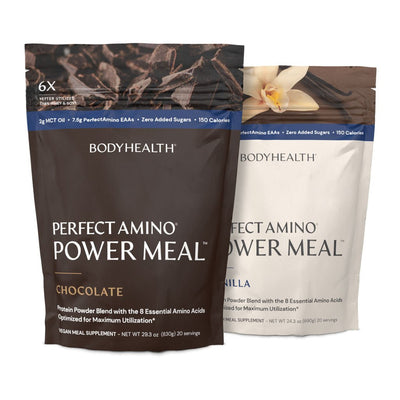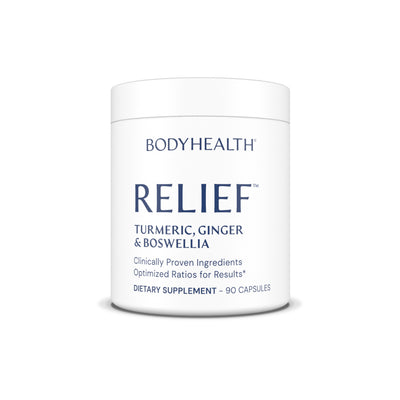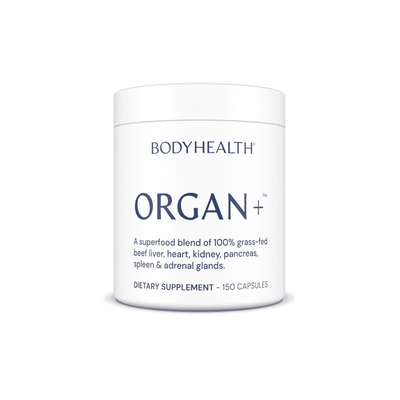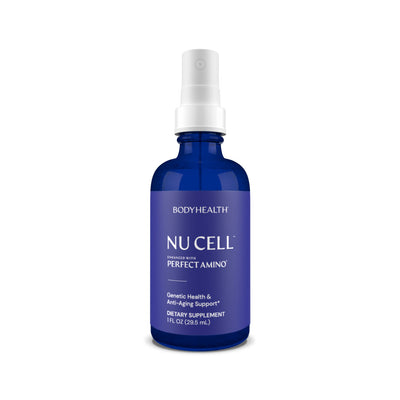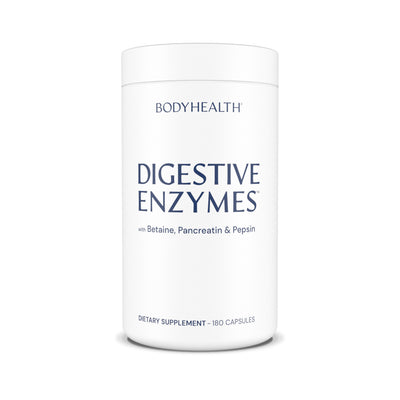Animal Protein Vs Plant Protein: Which Is Better For You
December 26, 2025 8 min read

Note: This article is not an effort to convince anyone that they should go on a carnivore diet or a vegan diet. It is simply to lay out information so that you can think for yourself and determine what is best for you.
IS VEGAN PROTEIN OR ANIMAL PROTEIN BETTER FOR YOU?
There is a lot going around right now about whether it’s better to eat meat or go on a vegan diet.
And there are many proponents of each, quite passionate, providing many different reasons why one is better than the other.
Unfortunately, they often contradict each other.
Some say meat causes an inflammatory response in the body, and can lead to weight gain or protein toxicity. That it’s bad for cardiovascular health and can raise cholesterol levels. And that it doesn’t contain fiber and other important vitamins and antioxidants.
Others say a pure vegan diet doesn’t provide all the nutrients present in meats such as b12 and other key vitamins, or iron, and that it leaves many people protein deficient due to lower levels of protein in plants, leading to lower strength and immune function.
But for each reason put forth as to why one is bad, someone else holds up an example to show how it isn’t true.
And, of course, there is also the moral aspect, which is personal to each individual.
But on a straight scientific basis, how is it that we do not have a definitive, agreed upon answer as to whether we should eat mostly meats or mostly plants?
And why is it that some people do better on meats, without reactions, and others on a plant-based diet?
With all of our ability to test and watch the various reactions within the body at the cellular level, it would seem pretty easy to find out.
Let’s dive in and see if we can answer this question for you.
THE MISSING PIECE IN THE ANIMAL VS PLANT PROTEIN DEBATE
Science, when unadulterated with opinion or emotion, is very exact. It’s just facts.
You observe what is and report on that.
If you see variables or exceptions, you look for the differences leading up to these exceptions, the missing piece of information that always comes before, not after, and which leads to facts that can be used to understand and improve a situation.
In science, we also don’t generalize. If some plants are poisonous would you say all plants are bad? Of course not.
If a piece of meat is spoiled do you say all meat is bad?
No. That’s taking one data point that applies to one specific thing and applying it to all similar things. If we do that, we’re operating off of wrong information and, obviously, will come to a wrong conclusion.
If in some people eating meats or plants causes a “bad” reaction, and in others causes a “good” reaction, we can’t pick a side and say it’s all bad or all good.
We need to look at the meat being eaten, or the plants being eaten and the people eating it. Then we see what the differences are and we can get real data.
While there can be individual reasons for some people, when it comes to animal proteins causing an inflammatory response, the largest missing piece is what is that animal being fed?
If they’re fed corn and soy, as most are today, their meat is much higher in omega 6 fatty acids, which causes an inflammatory response in the human body.
If they’re fed their natural diet of grass and wildflowers, their meat is higher in omega 3 fatty acids, which causes an anti-inflammatory response.
All meat, but fed on a different diet and producing a different result.
High omega 6 will also affect the cardiovascular system adversely while high omega 3 is beneficial.
Then there is the amount of processing that meat did or didn’t have. What chemicals and fillers were or weren’t added to it, each of which has an effect on the body.
But again, this is not the meat, it’s the added chemicals.
And lastly, due to the high amount of processed foods we eat, most people in America today have compromised digestive systems. Their stomach isn't able to fully break down the proteins they eat. And partially broken down proteins also cause an inflammatory response.
We see a great example of this with gluten. Those who have a reaction to gluten are actually reacting to the stomach's inability to break down key proteins in the gluten. These proteins, unbroken down, then cause the inflammatory response they feel.
This same thing occurs with any partially, not fully, broken down protein from meats to varying degrees, depending on someone's digestive system.
Digestive Enzymes help markedly with this and, as an aside, Gut Restore neutralizes gluten reactions.
So, with all of this, if we’re going to say meat is “bad” we need to say what meat. Where did it come from, what was it fed, what is its current chemical composition?
We need to be specific.
Okay, let’s turn to plant foods.
HOW PLANT EATERS AND VEGAN BODY BUILDERS ACTUALLY GET PROTEIN
Now, plants are very low in protein. They just are. They don’t have the levels meats do and on a gram for gram basis don’t provide what the body needs protein-wise.
This is a fact.
But a cow or horse or vegan body builder grows large muscles and does very well on only plant foods. This is also fact.
So we have two known and verified, but contradictory, facts… how does this work?
Well, again, we’re looking at the wrong thing. What is the difference?
First, we need to back up. If you read this article you know that we don’t actually need protein. We need amino acids.
When we eat protein our body breaks it down into the building blocks that make it up — the amino acids.
Our body then takes these and, if they are the correct amino acids and in the correct amounts, uses them to make new proteins in the forms the human body needs.
So in the end, no matter what type of protein it comes from, what our body actually needs are amino acids. Getting these amino acids is the only point of consuming protein.
With that said, if plants are so low in usable protein (amino acids) then how does an animal eating plants gets their amino acids? Because they must be getting them somehow or they couldn't grow large and muscular.
It's very simple. They don't get their amino acids from food.
Cows have a completely different digestive system than humans and get their protein (amino acids) in a completely different way.
You’ve probably heard they have stomachs, or four sections to their stomach. Well, in these sections, just as in ours, there lives a vast array of bacteria called the microbiome.
While humans get protein by eating a protein source so our stomach can break it down into amino acids which our body then uses to build new proteins, in cows this isn’t the case.
Grass has very little protein/amino acids value.
But in cows, they aren’t receiving amino acids from the food they eat.
Instead, a cow gets amino acids by making them.
You see, in a cow’s stomach, the grass is broken down, and the specific bacteria living there eat this.
Then, as a byproduct, the bacteria actually manufacture amino acids. They make amino acids where none existed before.
These amino acids are then absorbed through the walls of the cow’s intestines and go into the bloodstream where they're used to form new proteins.
So it’s a completely different process and source of amino acids for the cow than for a human.
For humans, we consume food that contains amino acids. We receive amino acids.
For cows, they consume food that feeds bacteria which then make amino acids where none existed previously.
In both cases we get the amino acids we need.
But then, what about our vegan body builder? Or those who truly do exceptionally well on a vegan diet?
Well, they have a similar microbiome full of bacteria that manufacture amino acids.
So they receive some amino acids from plant foods, though not enough to build the muscle they have, and then they get the balance of amino acids needed from the bacteria who are making them.
Their body then absorbs these and uses them just as it uses the amino acids they get from food.
SO IS ANIMAL OR PLANT PROTEIN BETTER FOR PEOPLE?
So in the end, the question of which is better depends on your body and the type of meats and plants you’re eating.
It isn’t fully one way or the other.
Some people have a microbiome that does very well producing amino acids from a pure plant food diet.
And some people have a microbiome that produces new amino acids to varying degrees.
Others produce almost none and do best getting their protein from meats.
They just have to be meats from correctly fed animals and unprocessed meats and plant foods.
If someone has gone off meats due to an inflammatory response, but now has other issues, they should look back at the meats they were eating to see if they were grass-fed and organic or not. That may have been the actual problem.
Or, if they’re now doing very well on a plant-based diet, feeling healthy, strong and high energy, then they should carry on.
But in the end it all comes back to amino acids. However we get them, we need to get enough of them. If we don't, we get low strength, energy, mood, immune function, hormones, and much more.
And while there are many who do very well on a solely plant-based diet, it’s about 10% or so of the population who do fantastically.
And many people on a plant-based diet do not have the microbiomes to fully replace the loss of amino acids from meats and so need to get their amino acids from another source.
HOW TO ENSURE YOU GET THE PROTEIN (AMINO ACIDS) YOUR BODY NEEDS
As said above, no matter where we get them from, our body needs amino acids.
If it doesn’t have enough amino acids, it can't build the proteins needed for muscle, skin, cells, hormones, bone, neurotransmitters, etc.
And we also need to ensure we get the other nutrients we might be missing out on, such as vitamins, antioxidants and bioflavonoids.
As far as those nutrients, Multi Complete, Greens and Reds, contain all of the nutrients our cells need to perform at their best, in the amounts we need.
And, especially with the amount of processing done to our foods today, stripping these nutrients from them, and the types of chemical fertilizers used, no matter where you stand, getting these vitamins and nutrients from an outside source becomes a necessity to maintain optimal health levels.
As for amino acids, PerfectAmino is pure essential amino acids in the exact ratios needed by the human body to ensure we get all of the protein and collagen building we need for optimal health.
They are 100% vegan sourced, but as they are pure amino acids, they are the same amino acids we would get from either plant or animal sources and so nothing is lost.
And, as they’re in the exact ratios needed by the human body, unlike other protein sources, animal or plant, they provide almost no caloric impact.
In fact, PerfectAmino provides 6 times the protein building equivalent of whey, pea and soy proteins, and 3 times the protein building equivalent of meats — but without the caloric impact.
They're also free of Gluten, Dairy, Soy, Sugar and MSG, and contain absolutely no artificial sweeteners.
If one is on a vegan diet, we recommend taking 2-3 servings per day to ensure you get your full protein needs.
If you do this for 2-3 weeks, you will notice a significant difference in how you feel, your strength and energy levels and even your mood.
I hope this helps.
Articles by Health Topic
Your Path To Better Health Starts Here!
From in-depth articles on nutritional benefits to updates on new product launches, stay informed and inspired on your journey to optimal health.
*These statements have not been evaluated by the Food and Drug Administration. These products are not intended to diagnose, treat, cure, or prevent any disease.







